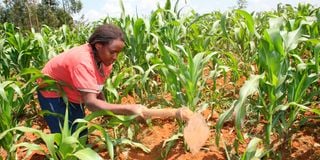Premium
Kenyan farmers support lifting of ban on GMOs

A farmer weeds her maize crop at Yamumbi in Uasin Gishu County. Small farmers will be crowded out by major GM foods growers because, to turn a profit, they must gravitate towards monoculture.
Kenyan farmers that have planted genetically modified crops for two years now have said that their yields and proceeds have improved, and they have asked Kenyans to embrace GM maize.
The farmers, more than 60 of them from the Society for Biotech farmers of Kenya (Sobifak) spoke when they gathered to reflect on the gains made in the past year, and to discuss how to further improve their productivity.
They also thanked the President for lifting the ban, saying it has allowed them to access climate-resilient and high yielding seeds.
“Well-tended Bt cotton is about three times more productive than conventional varieties. Growing this cotton has significantly reduced the use of pesticides by about three times, thus reducing the cost of production. Additionally, more time has been saved in the reduced number of pest control applications, thus farmers now have sufficient time for other income generating activities in the farm,” said Mr Daniel Magondu, the Sobifak chairperson.
He explained that prior to the commercialisation of Bt cotton, production had dwindled due to vicious cotton pests that damaged plantations, and which made farmers apply pesticides on the crop more than 12 times in a season.
This pesticide demand in turn led to high pesticide prices, which increased the cost of production.
Because most farmers could not afford the cost, they abandoned cotton farming, leading to collapse of ginneries because of lack of raw materials. As a result, the textile and apparel industry started to struggle, and other surviving ginneries continued to operate at low capacity due to insufficient cotton.
“High production cost (of conventional variety) has compromised farm productivity. On average, a farmer harvests about 500 to 600 kilogrammes of conventional seed cotton per hectare against a potential of 2,500 kilogrammes,” said Mr Magondu.
Two years later, the farmers say the returns from GM cotton have been impressive.
“We get good proceeds from Bt cotton, and we now earn enough farm income to provide food for our families and educate our children. With this experience, we can attest that GM crops have immense economic benefits for our farmers and our country,” said Mr Magondu.
Even then, farming of the cotton has been marred by challenges brought about by the drought, leading to losses, because the crop is not drought resistant. Just like conventional cotton varieties, it requires water to thrive.
“BT cotton seed is not widely available. Some farmers have tried to access this seed in vain. We appeal to the agriculture ministry and stakeholders to ensure availability of GM cotton seeds in all cotton growing regions,” he said.
While addressing the politics around GM crops, the farmers said they want to be left out of it, because they want no association with a group of farmers calling themselves Kenyan Peasants League. This group, said Sobifak, does not understand the plight of small holder farmers, who are passionate about adopting improved seeds.
They also called on the government to debunk misinformation and false perceptions about GM crops, noting that lies about the crops have been spread widely, and may affect its uptake and policy decisions about it.
“The Ministry of Agriculture should also revamp extension services and teach farmers best agronomic practices. Some farmers have failed to record optimum harvests from Bt cotton due to poor agronomic practices. Given our society’s wide membership base, we ask for representation in the proposed Fibre Crops Authority Leadership,” said Mr Magondu.
A week ago, African scientists from the Network of African Science Academies (Nasac) gave a nod to the growing of GM crops, saying they are safe to eat and have the same nutritional content as others.
“As Nasac, we wish to state that approved GM products are safe. Scientific authorities around the world, such as the US National Academy of Sciences, United Nations Food and Agriculture Organization ... have analysed thousands of scientific studies and concluded that GM food crops do not pose any risk to people, animals or the environment,” said Professor Ratemo Michieka, Honorary Secretary of the Kenya National Academy of Sciences.




